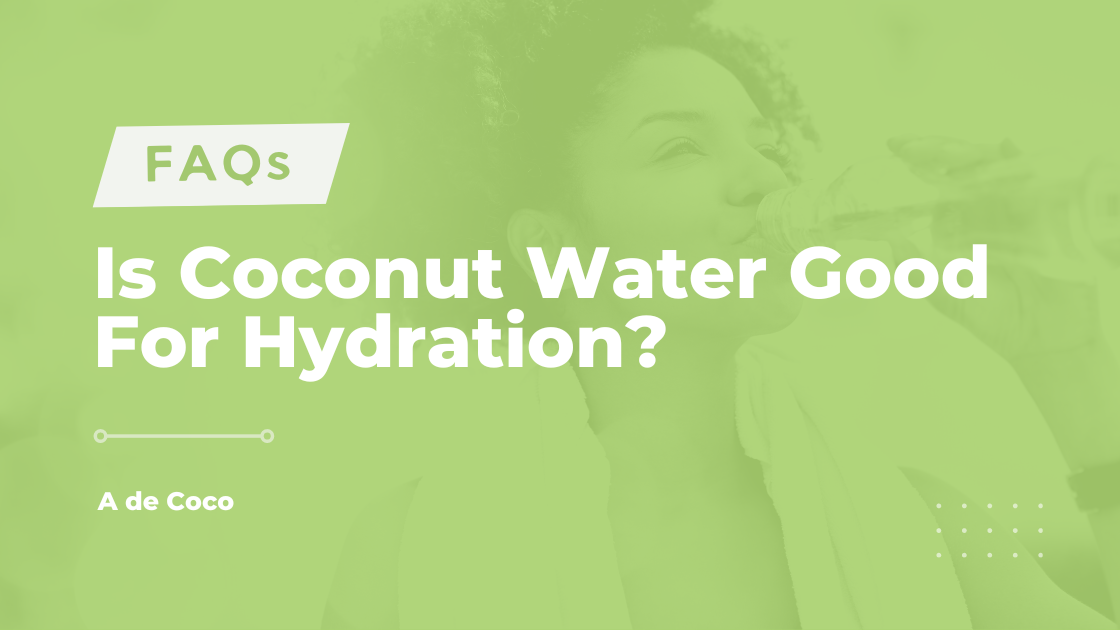The demand for natural and healthy beverages has been growing rapidly in recent years.
Among the variety of drinks available, coconut water has gained remarkable attention.
Known for its refreshing taste and perceived health benefits, it has become a staple for many health enthusiasts.
There is a common belief that it provides superior hydration qualities compared to plain water.
This claim has sparked interest and curiosity among both researchers and consumers alike.
This blog aims to delve into the hydration potential of coconut water, supported by findings from scientific research and expertise in the field.
Contents
- Is Coconut Water Good For Hydration?
- Understanding the Importance of Hydration
- What is Coconut Water?
- Analyzing the Nutritional Content of Coconut Water
- Coconut Water: An Excellent Source of Electrolytes
- How Does Coconut Water Promote Hydration?
- How Does Coconut Water Compare to Sports Drinks?
- Incorporating Coconut Water into Your Hydration Routine
- Is Coconut Water Good for Everyone?
- Fruit Hydration vs. Pure Water Hydration: A Comparison
- Understanding the Importance of Hydration
- What is Coconut Water?
- Analyzing the Nutritional Content of Coconut Water
- Coconut Water: An Excellent Source of Electrolytes
- How Does Coconut Water Promote Hydration?
- How Does Coconut Water Compare to Sports Drinks?
- Is Coconut Water Good for Everyone?
- The Bottom Line
Is Coconut Water Good For Hydration?
Yes, coconut water is good for hydration due to its high electrolyte content, which includes potassium, sodium, and magnesium. Its low calorie and sugar content also make it a healthier alternative to traditional sports drinks. However, it should not completely replace water in your hydration routine, as water remains vital in ensuring optimal health and hydration.
Taking this discussion deeper, we are set to delve into an array of additional key considerations surrounding hydration, such as exploring various hydration strategies, understanding the importance of proper hydration for physical performance and health, and further elucidating the role of other beverages in maintaining hydration.
Not only will we scientifically dissect the true potential of coconut water and examine how it compares to other hydration sources, but we will also touch upon the connection between hydration and overall wellness.
This extended discussion will provide a comprehensive understanding of the hydration puzzle, going beyond the basics, and will equip you with knowledge that could significantly enhance your well-being.
Understanding the Importance of Hydration
When it comes to optimal physical health and performance, hydration plays a crucial role.
It is the process of providing necessary fluids to body’s cells to ensure normal function.
The Role of Water in The Body
Water performs several tasks in the body.
It aids digestion, helps flush toxins, regulates body temperature, and participates in almost all of the body’s major functions.
Without sufficient hydration, our bodily functions would slow, leading to dehydration, which can be a life-threatening condition.
We also lose water continuously through perspiration, respiration, and the elimination of waste.
Therefore, it is necessary to replenish the water lost to maintain our hydration level.
Moreover, staying well hydrated can even boost your metabolism and keep your energy levels high.
The requirement of water may vary depending on a variety of factors, including age, gender, physical activity, weather, and overall health.
Significance of Hydration for Athletes and Fitness Enthusiasts
For athletes and fitness enthusiasts, hydration is of paramount importance.
When you exercise, your body temperature increases, causing your body to sweat and lose fluids and essential minerals.
If these elements aren’t replaced quickly and effectively, it can lead to dehydration and negatively impact physical performance.
So, it’s crucial to consume fluids before, during, and after exercise to sustain optimum hydration and performance.
In addition to simply drinking water, it includes replenishing the electrolytes that are lost in sweat.
These electrolytes are crucial for muscle function and overall performance during exercise.
Having watched this video, you will gain valuable insights about the role of coconut water in hydration.
You are likely to understand why it has emerged as a popular choice among athletes and fitness enthusiasts when it comes to hydration boost.
Symptoms of Dehydration
Staying hydrated can help avoid harsh symptoms of dehydration.
Dehydration can lead to a variety of symptoms ranging from mild to severe.
These can include dry mouth, fatigue, rapid heart rate, excessive thirst, decreased urine output, and in severe cases, confusion and fainting.
Additionally, prolonged dehydration can adversely impact kidney function leading to urinary tract infections and even kidney stones
Finally, it’s always a good idea to listen to your body and hydrate appropriately resulting in improved health and wellbeing.
What is Coconut Water?
Known for its refreshing and sweet taste, coconut water is the clear liquid that is found inside a young, green coconut.
Coconut water is essentially 95% water with a mix of unique nutrients.
Origin of Coconut Water
Originating from the tropical regions of the world, coconut water has been popularly consumed for centuries due to its high nutritional value and hydrating properties.
It has held a pivotal place in the cultures of regions like the Caribbean, Southeast Asia and the Pacific Islands.
Its popularity in the Western world, however, has significantly increased in recent years, especially among health-conscious consumers.
The Natural Process of Coconut Water Formation
Unlike coconut ‘milk’ that is extracted from the mature coconut’s meat, coconut water is an all-natural beverage.
As the coconut matures, the water inside starts to solidify forming the white, edible ‘meat’ of the coconut.
This solidification process showcases the natural process of coconut water formation and the nutritional value that it holds.
Being natural and loaded with essential nutrients, coconut water has become the go-to solution for many health enthusiasts.
This profound statement further strengthens the value coconut water holds from a health perspective.
The fact that it is devoid of any manufactured substances further makes it a natural, wholesome drink.
Nutritional Content of Coconut Water
Coconut water’s nutritional value is not to be underestimated due to its composition of nutrients.
While low in calories, coconut water is rich in several important nutrients like minerals, vitamins, and electrolytes such as potassium, magnesium, and calcium.
It also contains bioactive enzymes and amino acids that give it healing properties, hence its use to treat various ailments in traditional medicine.
Coconut Water is a Natural Hydrator
One of the key attributes of coconut water is its hydrating properties.
Due to its high electrolyte content, it acts as a natural hydrator, replenishing lost fluids and balancing electrolyte levels in the body.
This is why coconut water makes for an excellent replacement to synthetically produced sports drinks, providing essential nutrients without loading up on sugars and artificial preservatives.
Coconut water’s hydrating properties and its array of essential nutrients make it a superior choice over artificially produced sports drinks.
This highlights the value of choosing natural hydration sources like coconut water that offer not only hydration but a boost of essential nutrients.
The nutritional benefits of coconut water, along with its refreshing taste, make it the perfect hydrating drink for all ages and in all seasons.
Analyzing the Nutritional Content of Coconut Water
The health benefits of coconut water stem primarily from its impressive nutritional composition.
Naturally occurring in coconuts, this water hosts a wide variety of essential nutrients.
Macro and Micro Nutrients
Coconut water is a good source of several essential macro and micro nutrients.
These are the nutritional elements that our body needs in larger and smaller proportions respectively.
Among the macro nutrients, you’ll find carbohydrates and protein in coconut water.
Also, the fat content is surprisingly low, despite the widespread belief that coconut-derived products are high in fat.
The fat content in coconut water is surprisingly low, making it a healthful choice.
This misconception likely arises from the high fatty acid content in coconut oil and coconut meat.
The low fat content of coconut water, however, makes it an excellent choice for anyone watching their dietary fat intake.
When it comes to micro nutrients, coconut water excels in providing an abundance of vitamins and minerals.
Vitamins and Minerals in Coconut Water
Coconut water is rich in vitamins such as B-complex vitamins and Vitamin C,
The B-vitamins in this beverage are responsible for numerous body operations including energy production, while Vitamin C is a well-known antioxidant that boosts our immune function.
The mineral content of coconut water is where it really shines, with significant amounts of potassium, calcium, and magnesium present.
The high mineral content of coconut water, particularly potassium, calcium and magnesium, sets it apart from other beverages.
These minerals contribute towards good heart health, strong bones and teeth, and balanced bodily function.
Notably, coconut water’s unusually high potassium content supports proper muscle function and aids in maintaining fluid balance in the body.
This video provides visual insights into the diverse health benefits kindly offered by coconut water.
It will help you appreciate why this tropical beverage is gaining popularity in places far removed from the tropics.
Antioxidants in Coconut Water
Beyond the provision of essential nutrients, coconut water also provides us with additional health-supporting properties,
It contains antioxidants, which help to fight free radicals in our body, reducing oxidative stress and potentially lowering risk of several chronic diseases.
Coconut water’s high antioxidant content could help reduce oxidative stress and lower the risk for chronic diseases.
This is yet another factor positioning coconut water as a naturally healthy beverage option.
Though further research is needed, preliminary studies suggest these antioxidants can be beneficial in maintaining optimum health.
Overall, the features above reveal coconut water’s esteemed nutritional profile.
Keep in mind that natural, fresh coconut water could contain slightly different nutrient values compared to packaged products, so always check the labels!
Coconut Water: An Excellent Source of Electrolytes
When we talk about coconut water as an excellent source of electrolytes, we should first understand what electrolytes are and why they are essential for our body.
Electrolytes are minerals that have an electric charge.
They help balance the amount of water in your body and maintain a healthy pH level.
Our body depends on electrolytes for a variety of vital functions, including muscle contractions, nerve signals, balancing body’s pH levels, and regulating body’s fluid balance.
Coconut Water’s Electrolyte Content
Coconut water is incredibly high in several essential electrolytes including potassium, sodium, magnesium and calcium.
It’s particularly high in potassium, containing approximately 600 milligrams per cup.
This is more than the potassium content of an average banana, a fruit that is often touted for its high potassium levels.
The presence of these minerals makes this natural drink a powerful hydration agent, a great substitute to commercial electrolyte-filled drinks.
Coconut water’s composition fat-free and its high content of electrolytes makes it an efficient hydrating drink.
This statement accentuates the fact that in comparison to other drinks, coconut water offers a variety of electrolytes without the extra sugars and calories usually found in commercial drinks.
So it ensures you are getting your necessary hydration, without overloading on unwanted sugars.
The Role of Electrolytes in Hydration
Electrolytes are essential for maintaining fluid balance within the body, a critical component for athletic performance and general health.
This is because they are responsible for directing water and other nutrients to the areas where they’re needed most.
Thus if the body has an adequate amount of electrolytes, it would lead to optimum hydration.
So when we consume drinks like coconut water that are naturally high in electrolytes, we’re enhancing our body’s ability to stay hydrated.
Having an adequate source of these essential minerals can significantly reduce the chances of dehydration, especially during physical exertion or in hot weather.
In addition, since coconut water is low in sugars and calories, it becomes an ideal hydration drink, offering the electrolytes your body needs without the addition of excess sugar.
Proper hydration with electrolyte balance aids not only in keeping the body functioning optimally, but also supports physical activities by reducing the occurrence of muscle cramps and fatigue.
This highlights the importance of electrolyte balance for athletes and anyone engaged in physical activities.
Furthermore, it cements coconut water’s position as a healthier alternative to commercial sports drinks.
When you sweat, your body loses essential minerals and salts i.e., electrolytes.
Then, coconut water serves as an excellent replenishment source because of its high mineral content.
Thus, considering all these factors, we can conclude that coconut water’s rich electrolyte content supports effective hydration efforts, making it a worthy addition to anyone’s nutritional regimen.
How Does Coconut Water Promote Hydration?
Coconut water plays a vital role in promoting hydration due to its rich nutrient and electrolyte profile.
This unique beverage is the clear liquid found within the hollow interior of coconuts, and it’s notable for its refreshing taste and several health advantages.
Unlike water, coconut water contains crucial substances such as potassium, sodium, calcium, and magnesium, which help restore the body’s hydration status more efficiently.
In this informative video, you will grasp a more profound understanding of how coconut water promotes hydration and overall well-being.
Furthermore, the clip further explores the scientific reasons that make coconut water a superior hydrating agent compared to other common hydration techniques.
Nutritional Components of Coconut Water
The main hydration-boosting ingredients in coconut water are its minerals and electrolytes.
Notably, coconut water is a natural isotonic drink, meaning it contains a concentration of salts and sugars that is similar to what’s in our body.
Therefore, it’s highly efficient at replacing the fluids and electrolytes that are lost during physical activities.
On top of this, high potassium levels in coconut water outstrip that of many popular sports drinks.
Potassium plays a crucial role in hydration, as it helps regulate fluid balance and muscle contractions.
Coconut water is a natural isotonic drink, making it a highly effective hydration agent.
This isotonic nature of coconut water, coupled with its high levels of essential nutrients, means that it stands as a superior hydration option, especially for those who engage in moderate to intense physical activities.
Many athletes and fitness enthusiasts opt for coconut water to quench their thirst and replenish the electrolytes lost during workouts.
Regular consumption of coconut water can thus help prevent dehydration and maintain balanced body functioning.
Hydration-Benefits of Coconut Water
Including coconut water in your daily routine can supplement your body with the hydration it needs.
With its bioactive enzymes and amino acids, coconut water speeds up metabolism and detoxification processes in the body.
These factors, in turn, help maintain proper hydration and ensure more efficient elimination of waste products.
Research also shows that coconut water presents similar rehydration effects to a carbohydrate-electrolyte beverage, making it an effective hydration solution after prolonged periods of physical exertion.
Coconut water’s bioactive enzymes and amino acids assist in speeding up metabolism and detoxification, contributing to efficient hydration.
In effect, these properties contribute to coconut water’s impressive position as a healthy and natural way to stay hydrated.
With every sip of coconut water, you’re not simply quenching your thirst but also supplementing your body with the essential minerals it requires to remain healthy and prevent diseases.
Consumers are therefore becoming increasingly aware of coconut water’s potential health benefits and are integrating it into their daily hydration routine as a healthier, more balanced alternative to traditional sports drinks.
How Does Coconut Water Compare to Sports Drinks?
Coconut water has been touted as a natural alternative to artificially flavored sports drinks and energy drinks.
Packed full of vitamins, minerals, and electrolytes, its nutritional profile is impressive and goes beyond just hydrating the body.
But how does it stack up against traditional sports drinks and is it a better choice for hydration and replenishment of lost nutrients during physical activity?
Comparing the Nutritional Profiles
Most traditional sports drinks are essentially water, sugar, and artificial flavors and colors with added electrolytes like sodium and potassium.
They are designed to hydrate the body and replenish electrolytes that are lost through sweat during exercise.
On the other hand, coconut water is a natural source of electrolytes, specifically potassium, magnesium, and calcium, as well as small amounts of sodium.
In terms of electrolyte content, coconut water comes out on top as it naturally contains all these key minerals without any need for additives.
This quote draws attention to the fact that unlike sports drinks, coconut water does not require the addition of any artificial ingredients to provide these essential nutrients.
It provides an all-natural source of electrolytes and further supports the body’s hydration needs during and after physical activity.
Comparing Sugar Content
Another significant difference between coconut water and sports drinks is the sugar content.
Most sports drinks contain a high amount of sugar, typically in the form of high fructose corn syrup or a similar syrup.
This high sugar content can lead to a spike in blood sugar levels which can be detrimental to health in the long term.
On the other hand, coconut water contains a moderate amount of natural sugars and can be a healthier alternative to sweetened beverages.
Coconut water’s sugar content is significantly less than that of most sports drinks and additionally, it’s naturally occurring, not added.
This quote highlights the fact that while both sports drinks and coconut water contain sugars, the sugars in coconut water are naturally occurring and therefore a healthier choice.
Sugar content is just one aspect of health consideration, but an important one, as excessive sugar consumption is associated with various health problems.
Considering Taste and Preference
Apart from health and nutritional attributes, taste and personal preference also play a significant role in the decision between coconut water and sports drinks.
While sports drinks come in various artificial flavors, coconut water has a distinct subtle flavor that some people love and others do not.
It’s worth trying both and deciding based on personal preferences for taste, as well as nutritional needs and health goals.
Personal preference and subjective taste have a significant influence on the preference between coconut water and sports drinks.
This quote points out that while coconut water may have superior nutritional benefits, the ultimate decision may come down to individual tastes and preferences.
Therefore, one is not necessarily better than the other, but rather depends on the individual’s unique needs and preferences.
Incorporating Coconut Water into Your Hydration Routine
While understanding the benefits of coconut water, it’s crucial to know how you can incorporate it into your routine to promote hydration.
Here are some practical ways to include this nature’s sports drink in your daily life.
Starting Your Day with Coconut Water
One of the most effortless ways to incorporate coconut water into your routine is to start your day with it.
Instead of reaching for a cup of coffee first thing in the morning, consider swapping it with coconut water.
This will not only help kick start your metabolism but also ensure that you begin your day on a hydrating note.
Furthermore, it can also aid in flushing out toxins from your body first thing in the morning.
Instead of reaching for a cup of coffee first thing in the morning, consider swapping it with coconut water.
Of course, this doesn’t mean you have to completely give up your morning coffee.
This is simply an alternative way to ensure your body remains hydrated and benefits from the natural electrolytes present in coconut water.
Post-Workout Rehydration with Coconut Water
Coconut water is an excellent post-workout drink owing to its high electrolyte content.
It’s important to replace the electrolytes that the body loses through sweat during a workout, and coconut water can be an all-natural replacement for typical sugary sports drinks.
The best time to drink coconut water after a workout is within the window of 30 minutes post-exercise.
This is when your body is most efficient at replenishing lost fluids and electrolytes.
Additionally, coconut water can help restore energy levels due to its natural sugar content.
As a Midday Energizer
If you often find yourself feeling sluggish in the afternoon, coconut water can be your go-to remedy.
The natural sugars present in coconut water can serve as a quick energy booster, while its hydrating properties prevent dehydration – a common cause of fatigue.
The natural sugars present in coconut water can serve as a quick energy booster
Instead of relying on caffeine or processed energy drinks that can lead to a crash later, coconut water offers a healthier solution.
It is worth noting, however, that despite being a natural product, coconut water does contain calories and sugar, so moderation is key.
Between Meals
Coconut water can serve as a great drink between meals.
It not only keeps you hydrated but also helps to maintain satiety, preventing you from reaching for unhealthy snacks.
Between these applications and your own personal preference, you can find several practical ways to incorporate coconut water into your daily hydration routine.
Whether you drink it as it is or mix it with other healthy beverages, coconut water can be a versatile addition to your diet.
Is Coconut Water Good for Everyone?
Precautions and Considerations
While coconut water has gained considerable popularity due to its hydrating qualities, it’s essential to understand it may not be suitable for everyone.
Kidney Conditions
People diagnosed with kidney dysfunction require special attention when it comes to the intake of minerals.
Coconut water, albeit healthy, is high in potassium.
This mineral is capable of causing problems in people with impaired kidney functions as they may find it difficult to effectively filter it out of their blood.
All in all, for this specific group, excessively drinking coconut water could lead to hyperkalemia, a condition characterized by high potassium levels in blood, which can be potentially harmful.
Therefore, it’s imperative that if you are diagnosed with kidney disease, you should consult your doctor before incorporating coconut water into your regular diet.
Allergies
Coconut water, like many other foods and drinks, may cause allergic reactions in some people.
People who are allergic to coconuts should, undoubtedly, avoid consuming coconut water.
Reactions can range from mild such as hives or itching to severe, such as anaphylaxis.
Thus, those with a known allergy or those consuming coconut water for the first time should be cautious and seek medical help if any adverse reactions are observed.
Being mindful of allergens present in your diet is not just a precaution, it’s a vital part of managing your health.
Hence, it is always best to introduce a new food or drink item to your diet gradually and pay careful attention to any possible adverse reactions.
Medication Interactions
Certain types of medications may interact negatively with coconut water.
For instance, coconut water’s high potassium content can amplify the effects of certain blood pressure medications, leading to low blood pressure.
In the same vein, it may negatively interact with other drugs, such as potassium-sparing diuretics and certain stimulants for Attention Deficit Hyperactivity Disorder (ADHD).
Notably, the fertilizers used in coconut farming can also manifest in the coconut water and may interact with certain medications.
Thus, it is always advisable to seek the consultation of your health care provider or pharmacist if you are on medication and wish to introduce coconut water as a regular part of your hydration routine.
This ensures you avoid any potential drug-food negative interactions.
In conclusion, while coconut water is a trendy and beneficial drink for many, it should be enjoyed mindfully, taking these considerations and precautions into account.
As with most food items, moderation is often the key to achieving a balanced diet and a healthy lifestyle.
Fruit Hydration vs. Pure Water Hydration: A Comparison
As we venture deeper into the realm of hydration, it becomes essential to differentiate the various contributors toward our hydration needs.
Two major sources that often debate for supremacy are fruit hydration and pure water hydration.
Fruit hydration pertains to obtaining necessary liquids and vital nutrients directly or indirectly through fruits.
Meanwhile, pure water hydration refers to hydrating solely through water intake, lacking additional nutrients available in fruit and other forms of hydration.
Perks of Fruit Hydration
Fruits constitute a vibrant source of various vitamins, minerals, and healthy components such as fiber.
Their substantial water content can significantly contribute to daily hydration needs.
Moreover, fruits carry vital electrolytes, including potassium and magnesium, that maintain bodily fluid balance, especially beneficial for athletes and active individuals.
Fruit hydration opens avenues for individuals who struggle with plain water due to its taste, thus encouraging increased fluid intake.
Therefore, it can be stated, “hydrating through fruits has a dual advantage of providing essential nutrients along with fulfilling hydration needs.“
So, the nutritional element of hydration carries a significant priority among athletes and individuals engaged in regular physical activities.
The Clear Benefits of Pure Water
Even with the rising popularity of other hydration sources, it’s important to remember pure water’s undeniable importance in maintaining hydration.
Pure water doesn’t entail additional sugars and calories, unlike most other fluids, including fruit juices, thus serving as a beneficial option for weight-concerned individuals.
Water is a readily accessible, affordable, and effective hydration source that should form the majority of hydration therapy.
Considering its significance, “Pure water forms the basic foundation of human hydration.”
Hence, while fruit hydration can’t fully replace water, it’s a valuable addition to daily hydration needs, especially for those ravenous for a nutritional boost.
Make sure to watch this video where you will learn more about the numerous benefits of fruit hydration through the example of coconut water.
Get to see how a regular consumption of it can lead to holistic benefits for your body.
Striking a Balance
Rather than concluding either pure water or fruit hydration as the ultimate source, striking a balance between the two forms is the best route.
Having an assortment of hydration sources keeps the hydration routine vibrant and effortless.
It leverages the extensive benefits of both methods, maintaining a healthy body and promoting a refreshing return to hydration.
“Combining the strengths of fruit hydration and pure water hydration is a vital health strategy.“
Ultimately, understanding individual hydration needs and adapting to bodily requirements should take precedence in determining an optimal hydration routine.
Understanding the Importance of Hydration
Hydration is vital for all bodily functions from maintaining a healthy digestive system to promoting optimal brain performance.
Our bodies are approximately 60% water, making hydration fundamental for survival.
The benefits of being properly hydrated include better skin health, joint lubrication, and temperature regulation.
Despite its importance, many people find it challenging to remain adequately hydrated.
Consequently, understanding alternative sources of hydration becomes crucial.
What is Coconut Water?
One such alternative is coconut water, a clear liquid derived from the inside of a young, green coconut.
It’s been hailed as a natural, nutritious and refreshing drink.
Owing to its nutritional composition, it’s considered an efficient way to rehydrate and replenish electrolytes lost during physical exertion.
It isn’t a mere trend; coconut water has been consumed and revered in tropical regions for hundreds of years for its health benefits.
Analyzing the Nutritional Content of Coconut Water
Coconut water is loaded with vital nutrients.
These include five essential electrolytes: sodium, potassium, calcium, magnesium, and phosphorus.
It is low in calories, contains natural sugars and contains bioactive enzymes that aid in digestion and metabolism.
Unlike many other fruit drinks, coconut water is low in sugar and high in electrolytes, making it a healthier choice for hydration.
This unique nutritional composition enables coconut water to provide superior hydration.
The low sugar content also avoids energy spikes and crashes associated with high sugar drinks.
Therefore, coconut water can be a good choice for sustained energy and hydration.
Coconut Water: An Excellent Source of Electrolytes
Electrically charged minerals or ions present in our body fluids and tissues are called electrolytes.
These electrolytes regulate nerves and muscles, maintain pH balance, and help to rebuild damaged tissue.
Coconut water is naturally high in electrolytes, an attribute that makes it a popular choice for rehydration.
How Does Coconut Water Promote Hydration?
The high electrolyte content in coconut water makes it a potent hydrator.
The electrolytes found in coconut water are similar to those of our blood, this unique composition allows the body to absorb them quickly, thus promoting faster rehydration.
Coconut water has a similar electrolyte composition to human blood, making it a powerful hydrator.
This could be especially beneficial after physical activities that lead to excessive sweating and depletion of these electrolytes.
How Does Coconut Water Compare to Sports Drinks?
Essentially, coconut water can be thought of as nature’s sports drink.
It can supply your body with the same benefits of a typical sports drink, but without the added sugars and artificial ingredients.
Coconut water is a richer source of potassium than a typical sports drink.
Is Coconut Water Good for Everyone?
While coconut water is generally safe for most people, there are a few considerations to bear in mind.
People with kidney disease may need to limit their intake of fluids, including coconut water.
Despite being low in sugar, it does contain carbohydrates – therefore individuals with diabetes need to factor coconut water into their dietary plan.
The Bottom Line
The remarkable benefits of coconut water extend far beyond its refreshing taste.
This powerful hydration tool not only contains vital nutrients and provides a substantial source of electrolytes, but it also promotes overall hydration in a way that is healthy and natural.
When compared to other leading sports drinks, coconut water triumphs with lower calories and naturally occurring ingredients.
Additionally, incorporating coconut water into your daily hydration routine can make a significant difference for both athletes and fitness enthusiasts alike.
However, while its benefits are profound, it’s crucial to remember that not everyone may respond the same way to coconut water, and as such, individual considerations should be taken into account.
Overall, coconut water presents itself as an impressive alternative to conventional hydration methods and offers a great choice for those seeking a more natural route to maintaining good hydration.




